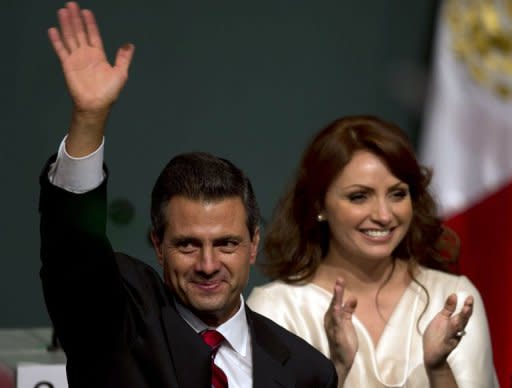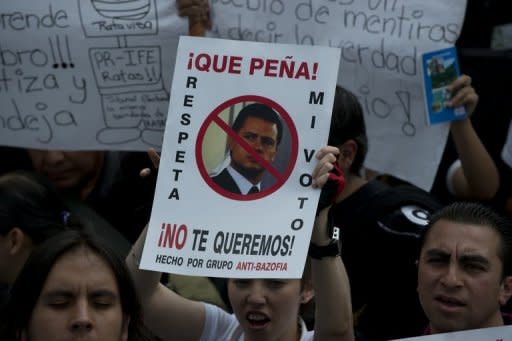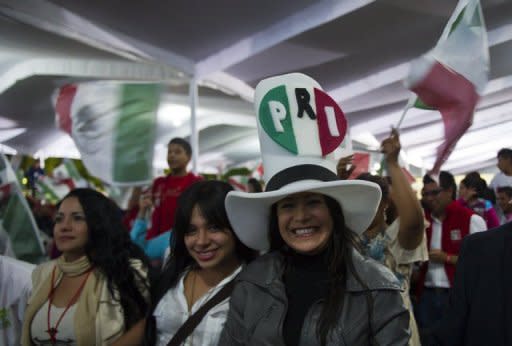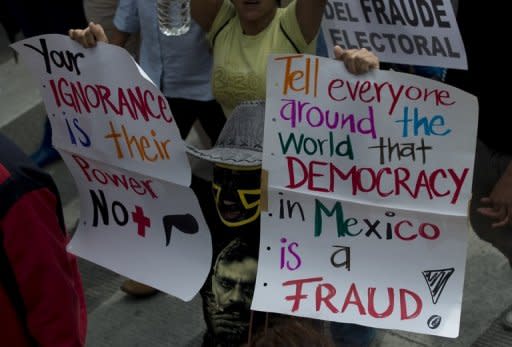Mexico election winner faces threat to legitimacy
Enrique Pena Nieto may have won Mexico's presidential election, but charges filed by his main opponent in an electoral court threaten to undermine his legitimacy even before taking office. While observers say it is unlikely that Pena Nieto's victory will be overturned based on leftist Andres Manuel Lopez Obrador's claim that the constitution was violated, the claims channel the anger many people feel over the way the election was won. Pena Nieto won by "buying" five million votes, shattering campaign spending limit, obtaining illegal support from PRI state governors, and enjoying paid biased media coverage that reported polls skewed in his favor, according to Lopez Obrador, the leftist runner-up in the vote. "The purchase and manipulation of millions of votes cannot give certainty to any result nor to the overall electoral process," Lopez Obrador told reporters late Thursday. "Article 41 of the constitution, which states that elections must be free and fair, was violated," he said. Pena Nieto of the Institutional Revolutionary Party (PRI) won the July 1 ballot by a 6.6 percent margin over Lopez Obrador, according to official vote results that included a recount at half of the country's polling stations. Lopez Obrador, from a coalition led by the Party of the Democratic Revolution (PRD), also came in second in the 2006 presidential election in which outgoing President Felipe Calderon was elected, losing by less than one percentage point. He claimed fraud, led protests that virtually paralyzed Mexico City for more than a month, and declared that he was the "legitimate" president. This time Lopez Obrador won nearly one million more votes than six years ago, but lost to Pena Nieto by 3.3 million votes, a much wider margin. The reason: a record-high voter turnout -- suspiciously high, Lopez Obrador claims, especially in low-income and poor rural areas where he claims voters were swayed by PRI gifts like department store gift cards, food, and building material. Top PRI official Pedro Joaquin Coldwell rejected the charges. Lopez Obrador "throws out baseless accusations, offending millions of Mexicans," Coldwell said. He dismissed Lopez Obrador as a "proven and repeat sore loser." Pena Nieto drew 38.21 percent of the vote, followed by Lopez Obrador with 31.59 percent and the ruling National Action Party's Josefina Vazquez Mota with 25.41 percent. Although the elections were clean, "the electoral process was not fair," opined Autonomous University of Mexico (UNAM) analyst Hector Tajonar. Pena Nieto "has had the support of the two big television networks, especially Televisa, ever since he took office as governor of the State of Mexico" in 2005, Tajonar said. Media giant Televisa and TV Azteca form Mexico's defacto TV duopoly. Their power is enormous, since surveys show that 95 percent of Mexicans learn of events through the TV news. "This indelible stain might be seen as a precedent of a democratic regression," said Tajonar. He said many Mexicans fear that Pena Nieto "will try to restore what we may call a neoauthoritarian regime through a renewed hegemony of the PRI supported by the two big television networks." The networks however say their coverage was balanced, and point to an UNAM study showing that they scrupulously gave each presidential candidate the same amount of air time. Televisa has also denied that Pena Nieto ever paid for positive coverage. The PRI was once synonymous with the Mexican state, governing for seven decades until 2000 using a mixture of patronage, repression, rigged elections and bribery. President Calderon, who congratulated Pena Nieto when the first results were in on election night, said that the alleged vote buying was "unacceptable" and something that "had to be immediately corrected." Top PAN leader Gustavo Madero said the conservative party will recognize the election results, but also asked electoral officials probe the vote buying claims. However since voters cast ballot in private, "it is impossible to prove that votes were bought," Arturo Nunez Jimenez, a member of Lopez Obrador's legal team, told the daily El Universal on Wednesday. Officials must also determine "if the vote that was supposedly bought was to benefit the presidential candidate, or for a deputy or a senator," who appeared on separate ballots, said Nunez Jimenez, himself a PRD governor-elect for the state of Tabasco. Pena Nieto called on all Mexicans to set their differences aside and unite. "This is the moment to build, not to obstruct," he said Wednesday. The putative president cannot afford to offend Mexico's two leading parties, as the PRI will have to negotiate with them in Congress, where it did not obtain the overwhelming majority they initially expected. The independent Federal Electoral Institute (IFE) has until September 6 to issue a verdict. Lopez Obrador said he would announce next week a "national plan for the defense of democracy and the dignity of Mexico." On Saturday, tens of thousands of demonstrators marched through Mexico City protesting Pena Nieto's victory.





